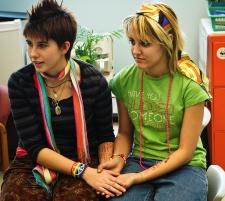On the wall of the classroom where You ROCK meets is a poster depicting a number of Lego-style blocks, each with a social justice message printed upon them. The statement is that “it just clicks.”
You ROCK — standing for “You Reaching Out, Creating Kindness” — is the diversity club at Sir Wilfrid Laurier high school in Orleans. And because it’s a diversity club, it aims to reach out to as many different students as it can.
“All of our stuff here is positive,” says You ROCK member Taylor, a queer student, pointing to a poster that the group made at the recent Safer Schools forum.
She says the group helps students accept gay teens at the school — but she says it’s a two-way street.
“They also have to accept who they are too, like anyone else,” says Taylor. “It’s sometimes a bit harder for us, but everybody has those issues with accepting themselves. Not only are we hoping to reach out this year to kids in our community, but those in the straight community.”
Corinne Davison, the teacher leading You ROCK, beams proudly as her students take us through their poster.
“One of the things that came up for me from that poster, is that whole thing about ‘acceptance period,'” Davison says. “That’s what You ROCK is all about. Whether you are male or female, whether you are gay or straight, or bi or trans, whether you are physically challenged or even learning challenged, we are an accepting group and we’re a place where we get together to try to change climate.”
Indeed, the students recount tales of how the climate at their school is already changing and becoming more accepting to queer students than others in the school district. Many recount tales of teachers standing up to homophobic comments made by students at school.
“All our teachers are like that,” Taylor says. “In every class that I’ve been in, if somebody said ‘that’s so gay’ or if they made a homophobic comment, the teacher is on them — like, right on them. Our school is really supportive.”
This marks a major change from years past, when homophobic comments were ignored by faculty. In fact, most other teachers will work with Davison to address homophobic comments by students if there are particular problems.
While the group has been in existence for longer than any of its current members have been at Sir Wil, its effect is being noticed.
“My sister was around when You ROCK first started up,” says member Emma Yoxon. “When I talk to her now about the school and the [safer schools] forum and everything that’s going on, she’s just astounded at how now our school is so much more accepting than it was back when You ROCK just started up, so just judging from her perspective, there’s a difference.”
Brothers Ben and Ashton Heaps both transferred to Sir Wil from another school.
“The school where we came from, it didn’t have a GSA or any kind of diversity acceptance at all,” Ashton says. “As a result, we weren’t able to be ourselves, and that’s why we really wanted to come to Sir Wil, and we tried a lot and now we’re here.”
The attitude of broader social acceptance is one that Ben likes about the club, and has informed his sense of what should happen societally.
“I really find that You ROCK not only teaches people, but it reaches out to people so that it can give them some knowledge that there are people like us — allies, gays, straights — in the community,” he says.
Under Davison’s guidance, You ROCK takes on homo-, bi- and transphobia in the school environment, but also looks to get the students involved in broader causes. The club not only took a leadership role in the Day of Pink, protesting against school bullying, but they also broadened out the Day of Silence to be about more than just homophobia, but to show that other groups similarly didn’t have a voice, whether they were victims of poverty, abuse, or other forms of discrimination.
As well, the club has done other social justice activities, like fasting to raise money for a senior’s home, and helping prepare food hampers for the holiday season.
“My personal goal for You ROCK is to have it be part of the fabric of the school,” Davison says. “So that we’re not apart, and not some club that has some special focus or special interest, because it’s not about that. It’s about acceptance.”


 Why you can trust Xtra
Why you can trust Xtra


